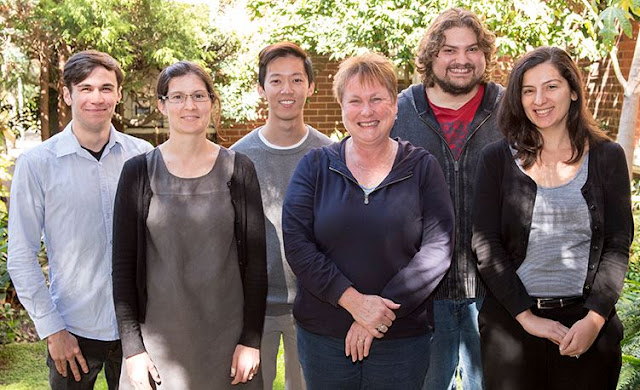 | |
April 2015. L-R: Mr Kyal Young (Honours student), Dr
Mhairi Maxwell (Research Officer), Dr Maverick Lau (Research Officer),
Associate Professor Margaret Hibbs (group leader), Mr Tim Gottschalk
(PhD student), Dr Evelyn Tsantikos (Research Officer). See more:
|
5 Jun 2015
Photo of the week: Margaret Hibbs lab group
Forthcoming CCS events: Seminars, public events, general notices
 |
| Katherine Langley, Baker IDI, at the 2014 CCS post graduate symposium |
CCS staff & students can see details of both public and local events (including professional development courses, trade fairs and Graduate Research Student calendars) and deadlines, at the Intranet's Announcements page.
Various Departments have their own calendars, see CCS seminar index: www.med.monash.edu.au/cecs/events/seminars.html
What's on for next week (8 - 12 Jun 2015)
| |||||||||||||||||||||||||||
| |||||||||||||||||||||||||||
In the Future | |||||||||||||||||||||||||||
Congratulations to our 2015 completed CCS postgraduate students!
So far in 2015, seven CCS postgraduate students have completed and passed their theses - well done!
Congratulations to :
- Sarah Charnaud (Burnet Institute): Mechanism of protein export in the malaria parasite
- Mark Fitzgerald (National Trauma Research Institute): Computer-aided decision support for trauma reception and resuscitation
- Matthew Kitson (Department of Medicine): Vitamin D status and chronic hepatitis C infection and nonalcoholic steatohepatitis
- Ying Ying Kong (Department of Immunology): Effects of cancer cells on the cells of the dendritic cell lineage
- Melissa Kirkovski (Monash Alfred Psychiatry Research Centre): The influence of biological sex on neurobiological mechanisms underlying autism spectrum disorder
- Michael Christopher (Baker IDI): Type 2 diabetes, obesity, insulin resistance and altered lipid metabolism
- Tanya Millard (Department of Infectious Diseases): Online self management program for men living with HIV in Australia
4 Jun 2015
Review article: Cell based therapies and lumbar degenerative disc disease
Low back pain and degenerative disc disease are a significant cause of pain and disability worldwide. Advances in regenerative medicine and cell-based therapies have led to the publication of numerous studies and clinical trials using these biological therapies to treat degenerative spinal conditions, often reporting favourable outcomes. Stem cell mediated disc regeneration may bridge the gap between the two current alternatives for patients with low back pain, often inadequate pain management at one end and invasive surgery at the other.
Review article: Chlamydia testing in general practice
As the cornerstone of Australian primary health care, general practice is a setting well suited for regular chlamydia testing, but testing rates remain low. This review examines the barriers and facilitators to chlamydia testing in general practice. While the barriers are well studied, many of the facilitators are not as well researched, and highlight areas for further study.
Reference: Yeung A, Temple-Smith M, Fairley C, Hocking J. Narrative review of the barriers and facilitators to chlamydia testing in general practice. Australian Journal of Primary Health Volume 21, Issue 2, 2015, Pages 139-147
Reference: Yeung A, Temple-Smith M, Fairley C, Hocking J. Narrative review of the barriers and facilitators to chlamydia testing in general practice. Australian Journal of Primary Health Volume 21, Issue 2, 2015, Pages 139-147
Review article: Epithelial ovarian cancer therapy
 |
| Prof Magdalena Plebanski, (seated) one of the authors, at work. A/Prof Cordelia Selomulya (standing) works with Prof Plebanski on a related project, ovarian cancer nanovaccine. |
Reference: Kampan NC, Madondo MT, McNally OM, Quinn M, Plebanski M. Paclitaxel and its evolving role in the management of ovarian cancer. BioMed Research International (2015). Article ID 413076
2 Jun 2015
Developing prognostics for post-TBI
 |
| Image: www.kplawonline.com/brain.html |
Reference: Yan EB, Frugier T, Lim CK, Heng B, Sundaram G, Tan M, Rosenfeld JV, Walker DW, Guillemin GJ, Morganti-Kossmann MC. Activation of the kynurenine pathway and increased production of the excitotoxin quinolinic acid following traumatic brain injury in humans. Journal of Neuroinflammation (2015) 12:110 doi:10.1186/s12974-015-0328-2
1 Jun 2015
3rd year MBBS students compete in inaugural PBL Feud Championships
 |
| The PBL Feud Champions of 2015 - Group 1, along with the host Fiona Foley and A/Prof. Laila Rotstein |
Participants sought: Can transcranial direct current stimulation enhance second language learning?
 |
| See more about the study: ccs-clin-trials.med.monash.edu.au/trials/can-transcranial-direct-current-stimulation-enhance-second-language-learning |
Odd spot: Ten Simple Rules to Win a Nobel Prize
Richard J. Roberts, winner of the 1993 Nobel Prize in Physiology or Medicine, writes, "It is remarkable how many students, young faculty, and even senior
faculty hanker after a Nobel Prize. Somehow, they think that it is
possible to structure their scientific careers so that the culmination
will bring this much sought-after honor. Some even think that as a Nobel
laureate myself, I may have the key to success—some secrets that I can
share and so greatly improve their odds of success. Unfortunately, I
must begin by disappointing everyone. There is only one path that should
be followed. It is summed up in Rule 1, but some of the other Rules may
prove helpful—or if not helpful, then at least amusing."
Reference: journals.plos.org/ploscollections/article?id=10.1371/journal.pcbi.1004084
Reference: journals.plos.org/ploscollections/article?id=10.1371/journal.pcbi.1004084
Subscribe to:
Comments (Atom)




